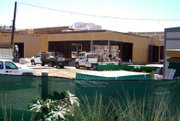New Retail Center Brings More Luxury to Malibu
Once an isolated colony of surfers and artisans, Malibu, Calif., will strengthen its claim to being a center for luxury retail when the Malibu Lumberyard, a new upscale shopping center with an ecologically friendly edge, opens later this year.
With tractors and construction crews feverishly working at the site of the Malibu Lumberyard, the retail center is scheduled to be open before late November. It is located on the corner of Pacific Coast Highway and Cross Creek Road. The new retail center will be built on the site of a former lumberyard on land owned by the city of Malibu.
It is located adjacent to the Malibu Country Mart, where paparazzi frequently gather to take pictures of celebrities shopping at exclusive boutiques such as Ralph Lauren, Seven For All Mankind, Oliver Peoples, Ron Herman and M.Fredric.
Malibu-based developers Weintraub Financial Services Inc. and Richard Sperber are leading the effort to build the luxury center, which is 100 percent leased. It will host tenants such as Kitson Men, Tory Burch, Intermix, Alice & Olivia and new fashion store At Charles, as well as a new location for pioneering fashion retailer Maxfield and a location for J. Crew Beach, the newly minted J. Crew concept.
The center also will offer two restaurants, Toscana and an as-yet-unnamed Mexican restaurant to be co-produced by Rande Gerber, husband of supermodel Cindy Crawford. Weintraub Financial Services President Richard Weintraub also said he will open an ice-cream parlor at the center.
Weintraub said he hopes his new center’s business will fit seamlessly into the city’s life.
“I’m not looking to say we’re fancier than anyone,” Weintraub said. “We want to become part of the Malibu experience.” One reason why the city awarded him the lease to the lumberyard site is that he promised to keep the place as unique as Malibu. “The City Council was very clear that they did not want another mall,” he said.
He said it cost $20 million to build the more than one-acre center. The center is forecasted to generate a minimum of $300,000 in sales tax annually.
Malibu is an underserved market, according to Fraser Ross, owner of the high-profile boutique stores under the Kitson name. “It’s a pocket of retail that is not saturated,” he said. “There are few men’s stores there.”
Kitson Men at the Malibu Lumberyard will go native in its own way. It will offer many of the items sold at the original Kitson Men store on Robertson Boulevard. But beachwear such as flip-flops and boardshorts will be merchandised along with the typical Kitson focus of jeans. Price points will range from $28 flip-flops to $1,200 diamond-studded pens.
Weintraub leased the land from the city of Malibu in 2005. Some part of his rents to the city will be used to develop Legacy Park, a 15-acre nature park adjacent to the Malibu Lumberyard. (Private donations have also funded the development of the park, which could cost more than $20 million, said Malibu City Councilmember Jefferson Wagner.)
A square foot of commercial space in the 30,316-square-foot retail center ranges from $15 to $20, according to retailers and real estate executives familiar with the project. Jay Luchs of the CB Richard Ellis commercial real estate company has led efforts to bring luxury tenants to the Malibu Lumberyard.
Nature and a sense of roughing it also will be crucial to the look of the Malibu Lumberyard. The retail center will be organized around a courtyard that will feature a play area for children and several cylinder-shaped aquariums.
The unusual shape of the aquariums was designed to look like the wood pilings or pillars that hold up a pier—a nod to Malibu’s roots in water sports as well as the place’s former use as a lumberyard, according to the project’s architects, Herb Katz, Yvonne Schenk and Phillip Trigas of RTK Architects in Los Angeles.
The site’s three buildings will be constructed out of a steel-like material called Cor-ten. The center also will make use of reclaimed wood and stone in the buildings. Weintraub also intends for the center to generate some of its own energy through solar power.
Malibu Councilmember Wagner said the Malibu Lumberyard will be an asset to the city, but it did not come without controversy. A hardware store had operated on the site until the high cost of Malibu real estate proved prohibitive for the lumber operation. The departure left the arts and crafts–obsessed city without a lumberyard, said Wagner, the owner of core surf shop Zuma Jay since 1975.
“The big issue was we don’t have a lumber store, but we have a Gucci store,” Wagner said. “But it will be a good lease for the city.”






















